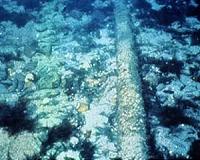 |
Seoul (AFP) March 8, 2011 North Korea is hoping to sell UN-backed carbon credits from hydropower plants now being built, an aid group said Tuesday, as the isolated communist state struggles to secure more sources of hard cash. If approved by the United Nations, the North would be able to sell carbon credits to governments and companies trying to meet global greenhouse gas emissions reduction targets. The North asked the Hanns Seidel Foundation, a Munich-based development NGO, to help register its hydropower projects at the UN-approved verification agency known as TUV NORD, said the foundation's representative in Seoul. "We are talking about eight power plants, with the smallest size about 7.5 megawatts. These are not big projects but small or medium-sized projects," Bernhard Seliger told AFP. None has yet been completed, he said. "I saw some (construction) sites in South Hamkyong province but that's not all. There are other plants in other regions," Seliger said, adding that some of the projects are led by the UN Development Programme. The Hanns Seidel Foundation has been working since 2003 to build the North's development capacity, and in 2008 organised a seminar on carbon trading for Pyongyang officials at their request. The tradeable credits, called Certified Emissions Reductions, are awarded for approved clean-energy projects such as hydropower plants or wind farms. Big polluters elsewhere in the world can buy them as part of their efforts to cut emissions. Seliger said his foundation is helping the North to prepare for the auditing process required to join the UN carbon credit trading system known as the Clean Development Mechanism. "One good thing about this project is that it is very transparent, involving monitoring and auditing on an annual basis... I think it is very good for North Korea to participate in such an international regime," said Seliger. An official at a South Korean state agency, the Korea Energy Management Corp, said registration would take at least a year or two and it was unclear how much the North would be able to earn if approved. The official, who declined to be identified, said a typical eight-megawatt hydropower plant could yield about 19,500 carbon credits each year, each of which was currently traded at 12 euros in global markets. This would amount to around $327,000 a year. But some buyers may shun the communist state, given its history of nuclear and missile development which has led to international sanctions. "Government buyers will certainly shy away from dealing with the North," said Koo Jung-Han, a researcher at the Korea Institute of Finance. "But private companies have few reasons not to buy credits from the North as long as it can offer a competitively low price. However, the big question is whether the North will be able to build the plants without outside financiers." Koo said that countries hoping to buy carbon credits from upcoming overseas projects often encourage investment in the ventures by their own finance companies. "But what kind of financial companies will take a plunge in projects in such a volatile, politically risky country like North Korea?" The North suffers persistent power shortages even in the showpiece capital Pyongyang. Many rural areas receive power only during key agricultural seasons, and must rely for the rest of the year on alternative fuels, according to a recent policy paper published by the Nautilus Institute think-tank.
Share This Article With Planet Earth
Related Links
 Iceland eyeing giant cable to sell power to Europe
Iceland eyeing giant cable to sell power to EuropeReykjavik (AFP) March 7, 2011 Iceland is considering building the world's longest sub-sea electric cable to allow it to sell its geothermal and volcanic energy to Europe, the country's largest energy company said Monday. "This project started last year and the current phase of research should be finished by the end of the year... We will (then) have clearer information about the feasibility of the project," Landsvirkjun ... read more |
|
| The content herein, unless otherwise known to be public domain, are Copyright 1995-2010 - SpaceDaily. AFP and UPI Wire Stories are copyright Agence France-Presse and United Press International. ESA Portal Reports are copyright European Space Agency. All NASA sourced material is public domain. Additional copyrights may apply in whole or part to other bona fide parties. Advertising does not imply endorsement,agreement or approval of any opinions, statements or information provided by SpaceDaily on any Web page published or hosted by SpaceDaily. Privacy Statement |